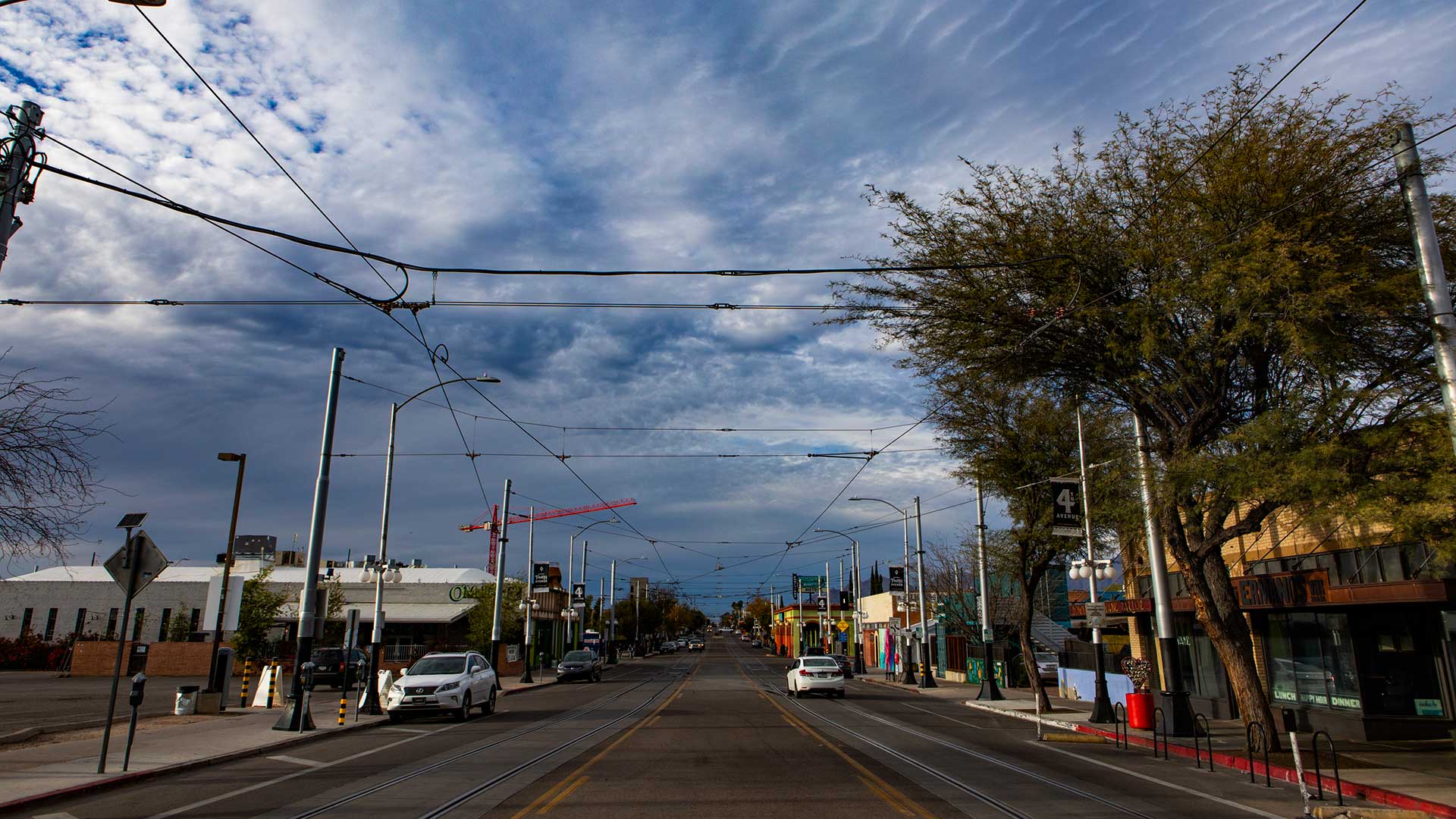 Fourth Avenue, an important commercial and entertainment hub in Tucson, is quiet on Sunday, March 22.
Fourth Avenue, an important commercial and entertainment hub in Tucson, is quiet on Sunday, March 22.
Coronavirus response

The last two weeks have seen schools close, restaurants forced to do takeout only, and a massive shift to working from home. All of these "social distancing" efforts are intended to help slow the spread of coronavirus so that the number of people who get sick doesn't exceed the capacity of the health care system. Hopefully, these efforts will save lives. But it's also drastically changing our everyday patterns, and no one knows for how long.
Michael Worobey leads the Department of Ecology and Evolutionary Biology at the University of Arizona. He studies the origin and control of viruses including the 1918 Spanish Flu, the last major pandemic to hit the U.S.
"This outbreak is shaping up to have the potential to look a lot more like that pandemic than I was hoping a couple months ago,” Worobey said. “We're in a really serious situation.”
He said that the impact of the virus will have a lot to do with how various governments respond and pointed to South Korea as a county with a strong response and subsequently lower case fatality rate. Though he said it would be fair to call this the worst pandemic in recent history, Worobey made it clear that this pandemic has not fully played out yet.
COVID-19 experience
So what does it feel like to get COVID-19? University of Arizona student Lauren Salgado shared some of her experience.
"What happened first was my throat was hurting, and then I got a really bad headache, that headache didn't leave for days. The fever was constant, my stomach was really bad.... I had body aches, it just hit really fast,” Salgado said.
After being tested for the flu, she said her doctor decided to test her for COVID-19 because she also has asthma and is at higher risk. On day four of her illness, she got the call that the test was positive.
Lauren stayed at home for her treatment, following doctor’s orders to use over-the-counter medications, cold showers and ice packs to help keep her fever down.
She said after her experience she has a message for people.
“I think that there are people out there who don’t think this is a real thing, that it's not going to affect them, and I just want everyone to know that this can affect you,” Salgado said. “If you are not feeling symptoms, definitely stay home, because you don’t want to feel them. I wasn’t feeling symptoms and I still got it.”
Studying remotely
One of the first things to close due to coronavirus were schools and universities. This week, many school districts started distributing meals to students who normally rely on nutrition from the cafeteria. The Tucson Unified School District is offering free meals to any kid 18 and under, regardless of whether they're a student of the district or not.
Like universities across the country, the University of Arizona made the decision to move all classes online for the remainder of the semester. Commencement has been cancelled.
The Buzz's student production assistant Vanessa Ontiveros shared how some UA students feel about the changes.
“In the past two weeks, professors have been scrambling to move classes online, which means students have been scrambling to catch up with all the changes,” Ontiveros said. “It does not help that there is no real consensus about how news is delivered to students. I have professors who use email, some who use D2L [online learning software], some who use both, and even one who’s thinking of setting up a Facebook group for the class.”
Last week, Maritza Almanza, a UA sophomore, started a petition to have the university give students the option to have their classes graded on a pass/fail system. The UA has since announced it will implement such a system.
On top of school-related worries, students also have a lot of the same worries as everyone else right now. Students work, pay rent and socialize just like everyone else. And students, like everyone else, just want things to get back to normal.
“The way I’ve been thinking about it is like this: Before Spring Break I was like a hamster on a wheel,” Ontiveros said. “Once that thing starts spinning, it’s hard to stop. Now my routine and that wheel are gone. I think I’m supposed to run laps around my cage, but honestly, I’m not sure, and I don’t want to run as much because there isn't a clear path set before me.”
At-home teaching for parents
As university students shift to online learning, many parents are stuck at home trying to keep their kids active and engaged while also keeping the household running during K-12 school closures. For now, the governor and state superintendent of public instruction have said schools will remain closed through April 10.
Michael Sulkowski, an associate professor in the school psychology program at the University of Arizona about ways parents can cope with this new normal.
“I think it's important for parents not to try and be an expert teacher and to be a parent first,” Sulkowski said. “To really think about, what really constitutes learning? Learning doesn't necessarily mean throwing materials at students or even allocating a lot of time to specific tasks, it's about making sure that student, the child — your child, now your student — feels comfortable accessing the curricula and able to ask you questions in the way that they might ask a teacher.”
Sulkowski also recommended that parents take time to ask their children how much they know about what is going on right now and to assure them that things will go back to normal.
Restaurants switch to takeout
For the last week, restaurants and bars throughout Pima County have been figuring out how to change their operations to respond to orders to limit food service to takeout or delivery only. But that has not been enough to make up for a lack of people eating out.
"It's devastating. There's no sugar-coating it," said Ande Motzkin, owner of Caruso's Italian Restaurant. Many businesses on Fourth Avenue count on spring festivities like St. Patrick's Day and the Fourth Avenue Street Fair to offset the slower summer months, when many students and retirees typically leave Tucson.
Bars and breweries are also trying to find ways to keep sales up while they can't serve customers in normal ways. While many breweries are switching to takeout cans, bottles and growlers only, hop shop owner Jessie Mance decided to close after about a week of offering the takeout service due to coronavirus concerns.
“It was basically just feeling like we weren’t doing our part to keep people at home. We felt very conflicted about encouraging people to come by, even if it was just for a short little meet and greet, grab your bottles and go,” Mance said.
More information about how local restaurants are adapting is available here.
Immigrant community concerns
Roughly one in eight Arizona residents are immigrants. More than 25,000 are recipients of DACA, the Obama-Era Deferred Action for Childhood Arrivals program. The fate of that program still hangs in the balance at the U.S. Supreme Court, but the pandemic has Arizona’s DACA and mixed-immigration status families wondering what safety net exists for them.
Jose Patiño is the education and advocacy director at Aliento, a Phoenix nonprofit that supports DACA, undocumented and mixed-status families in Arizona. He's also a DACA recipient. Patiño spoke about how that community is feeling about coronavirus.
One obstacle is that U.S. Citizen and Immigration Services, the government agency that handles DACA renewals, closed due to the pandemic. If a person does not renew their DACA before it expires, that can threaten their employment eligibility.
He also said that undocumented people are not going to get tested for COVID-19 due to lack of insurance, trouble finding tests or fear of being found by Immigration and Customs Enforcement. “I don’t know anybody who has gotten tested who is a DACA recipient or undocumented,” Patiño said. “So, it’s like, how do you get access to that system? Because it’s not set up for us.”
The governor's office has said DACA recipients are eligible for unemployment in Arizona. Patiño said they're working with state legislators to better understand exactly what's available to immigrant families, but a lot is still unclear.
Stay up-to-date with AZPM’s coronavirus coverage.
We want to know what you're thinking about. Share your questions about COVID-19 here or call and leave a voicemail at 520-621-5999. The Buzz will have experts answer your questions on an upcoming show.



By submitting your comments, you hereby give AZPM the right to post your comments and potentially use them in any other form of media operated by this institution.